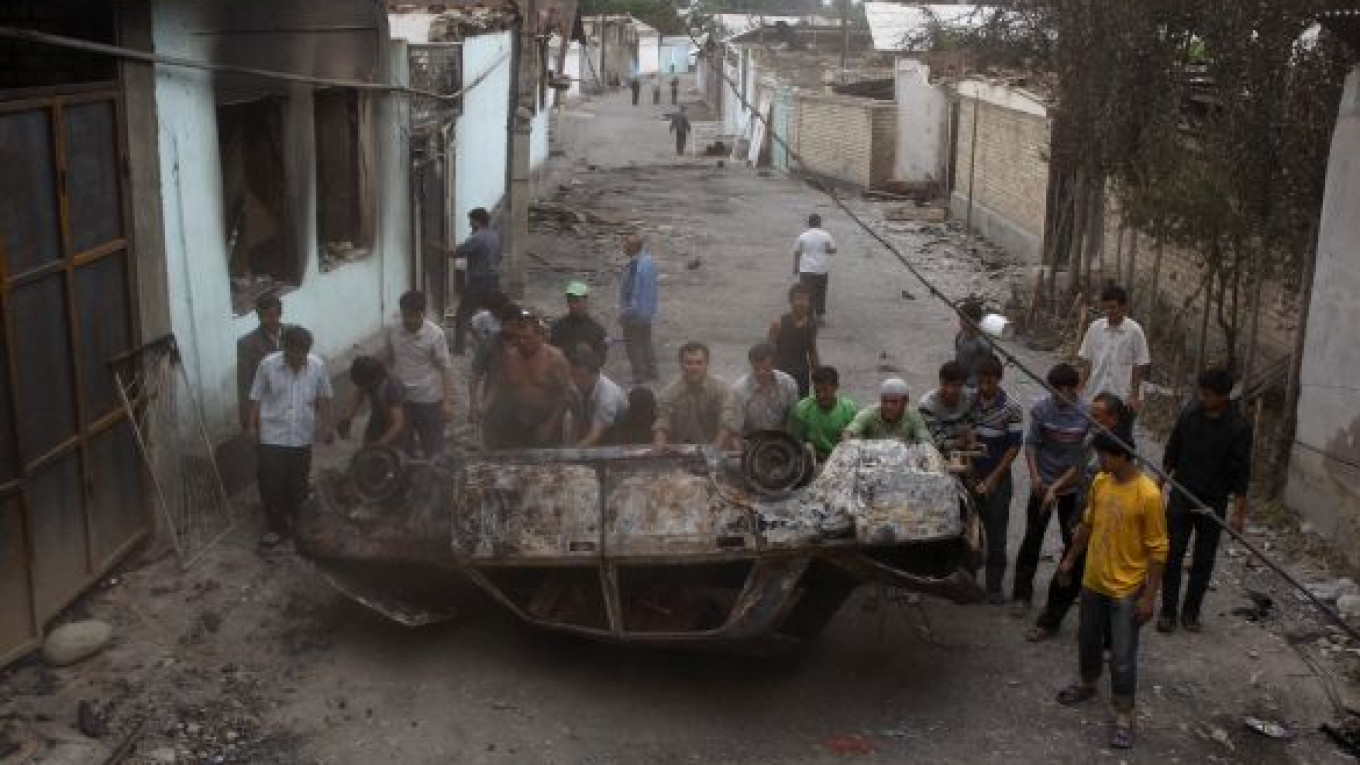SURATASH, Kyrgyzstan — Makeshift camps on both sides of Kyrgyzstan's border with Uzbekistan are home to 400,000 refugees uprooted by ethnic violence, the United Nations said Thursday, and the area remains extremely tense.
Many refugees are running short of basic supplies and fear new attacks. In one camp, clay houses were crammed with dozens of refugees and many others were having to sleep rough.
At least 191 people have been killed since June 10 in south Kyrgyzstan in clashes between Uzbeks and Kyrgyz. The government says the death toll is several times higher.
In Osh, the epicenter of the clashes, people in Uzbek neighborhoods have built barricades, in effect demarcation lines separating them from Kyrgyz parts of the city.
The army has set up checkpoints around Osh but its security presence is low. Groups of men armed with AK-47s patrolled the streets. It was unclear where their allegiance lay.
Several Uzbeks were attacked after crossing into the Kyrgyz side to visit a hospital, observers on the ground said.
"It's extremely tense. It's highly flammable. Uzbeks and Kyrgyz are completely separated," Ole Solvang, an observer from Human Rights Watch, said during a visit to Osh, the country's second-largest city and close to the Uzbek border.
Home to U.S. and Russian air bases, Kyrgyzstan has been turbulent since a revolt in April toppled its president, Kurmanbek Bakiyev, and brought an interim government to power.
The new leadership, which has not been formally elected, is holding a referendum on June 27 on constitutional changes it says will make the country more democratic.
The government issued a decree saying it would cancel the referendum only if the entire country were in a state of emergency, or if a state of emergency were to be enforced in regions containing more than half of the total electorate.
It needs the vote to entrench its rule and has been broadcasting frequent television advertisements promoting the poll, but it said it could not guarantee the violence was over.
The United Nations High Commissioner for Refugees said in a statement some 300,000 refugees were massed on the Kyrgyz side, citing information provided by the interim government and nongovernmental organizations on the ground.
A further 100,000 people have poured into Uzbekistan since last week, it said. Kyrgyzstan's population is 5.3 million.
"Sporadic clashes have reportedly taken place around the town of Jalal-Abad and the situation there is tense," the UN refugee agency said in a statement. Jalal-Abad is close to the Uzbek border in southwestern Kyrgyzstan.
In one camp, refugees lined up for bread distributed from local stockpiles. Many of them were women and children, and some had weeping sores on their feet. They boiled and drank clay-colored water drawn in buckets from a pool in the village.
"We no longer have any trust left for the Kyrgyz," Mavlyuda Abdrakhmanova, a 43-year-old woman, said. Many others were holed up in remote hideouts with little food and water, locals said.
Humanitarian aid has been flown into the region from Russia, the United States and other powers. But observers on the ground said it was not reaching most camps and neighborhoods on the Kyrgyz side because of security concerns.
Amnesty International called for an international inquiry.
"The … interim government must react immediately to allegations of collusion of security forces and send a clear signal that any human rights violations will be prosecuted," it said.
Officials were unavailable for comment late Thursday.
U.S. Secretary of State Hillary Clinton spoke to interim leader Roza Otunbayeva by telephone on Thursday to discuss the conflict, the interim government said in a statement.
Assistant Secretary of State Robert Blake, the top U.S. official for Central Asia, is due to visit Bishkek on Friday.
Otunbayeva earlier spoke to President Dmitry Medvedev.
Despite Kyrgyzstan’s pleas, Moscow — which sent troops to Kyrgyzstan in 1990 to quell a similar conflict when Central Asia was part of the Soviet Union — has refused to intervene this time, describing it as a domestic Kyrgyz issue. The Collective Security Treaty Organization, a Russian-dominated security bloc, said it would instead send advisers to help avert further unrest.
A Message from The Moscow Times:
Dear readers,
We are facing unprecedented challenges. Russia's Prosecutor General's Office has designated The Moscow Times as an "undesirable" organization, criminalizing our work and putting our staff at risk of prosecution. This follows our earlier unjust labeling as a "foreign agent."
These actions are direct attempts to silence independent journalism in Russia. The authorities claim our work "discredits the decisions of the Russian leadership." We see things differently: we strive to provide accurate, unbiased reporting on Russia.
We, the journalists of The Moscow Times, refuse to be silenced. But to continue our work, we need your help.
Your support, no matter how small, makes a world of difference. If you can, please support us monthly starting from just $2. It's quick to set up, and every contribution makes a significant impact.
By supporting The Moscow Times, you're defending open, independent journalism in the face of repression. Thank you for standing with us.
Remind me later.


